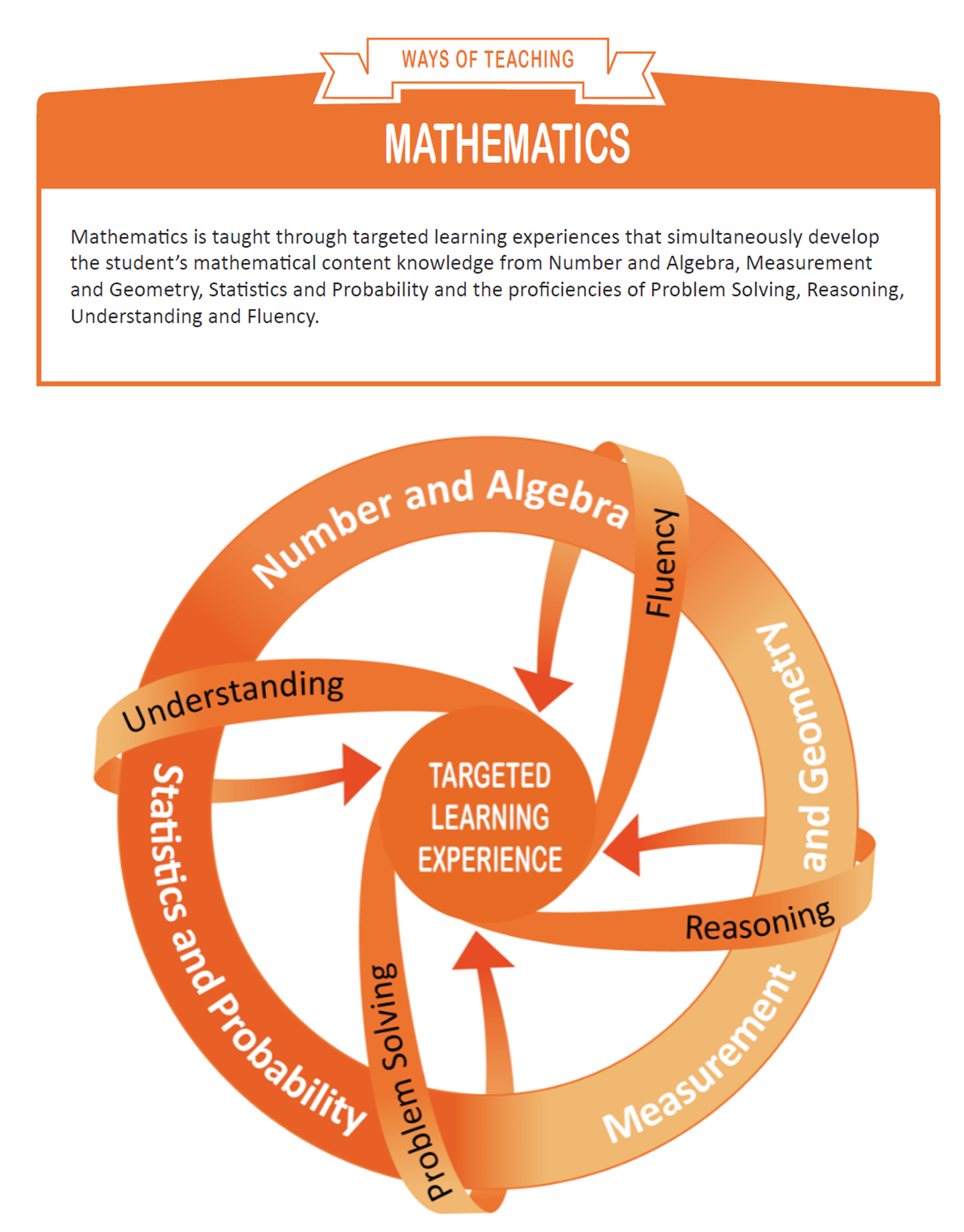Ways of Teaching
The 'Ways of Teaching' supports teachers to plan curriculum delivery across the phases of learning. The teaching in each year should acknowledge and extend learning from previous years.
The 'Ways of Teaching' complements the principles of teaching and learning in the Western Australian Curriculum and Assessment Outline (http://k10outline.scsa.wa.edu.au/). The principles focus on the provision of a school and class environment that is intellectually, socially and physically supportive of learning. The principles assist whole-school planning and individual classroom practice. All students are given the opportunity to achieve the standard at their current year level, whilst teachers identify and implement appropriate interventions to support students’ progress towards this standard.
The three content strands of Number and Algebra, Measurement and Geometry, and Statistics and Probability together with the four proficiency strands of Problem Solving, Reasoning, Understanding and Fluency define the mandated Western Australian Mathematics Curriculum. The proficiencies describe how the content is to be explored and taught and should be developed simultaneously with the content. The four proficiency strands describe the actions of the thinking and doing of
Mathematics. These together with the mathematical content become increasingly sophisticated as students’ progress from Pre-Primary to Year 10.
Teaching Mathematics is about making connections to existing knowledge in order to solve new problems both within and beyond mathematics. It is about showing students the power and beauty of Mathematics and its relevance to the real world. Students must engage with both the content and the proficiencies in order to become flexible, creative and critical problem solvers and mathematical thinkers of the 21st century.
Programs are planned to ensure:
- content and proficiency strands are developed simultaneously
- major conceptual ideas from the current year syllabus are central to teacher programming
- all learning experiences within the program are purposeful, developmentally appropriate, and support the long-term learning outcomes
- connections are made between the year level content and past and future learning
- prior knowledge is taken into account and is extended
- appropriate planned interventions support students’ progress towards the achievement standard where required
- transferable skills and thinking processes are developed through problem solving
- activities are accessible and challenging to all students, providing opportunities for inclusivity and differentiation
- the literacy of Mathematics (language, graphics, symbols) is developed
- appropriate materials, models, images or other representations are used purposefully to support students to move towards abstract ideas and create new knowledge and strategies
- opportunities are created to allow students to communicate and justify their strategies and solutions
- the relevant general capabilities and the cross-curriculum priorities are incorporated to assist students to live and work successfully in the 21st century
Targeted learning experiences are created so that students:
- value and develop the behaviours described in the proficiencies
- represent, solve or explore meaningful and unfamiliar problems and situations
- have time to think about and engage with problem situations, making sense of new concepts, ideas and experiences
- apply learning from one problem to other problems that involve different scenarios or contexts
- build and select from a repertoire of strategies to address learning tasks
- have purposeful opportunities to work independently and collaboratively
- answer focused questions and participate in guided mathematical conversations that deepen thinking, strengthen understanding and lead to generalisations
- comprehend and communicate ideas using appropriate mathematical language
- understand the purpose and intent of the learning activity and, if appropriate, its connection to the real world
- are accountable and responsible for their learning
- confidently seek and act upon constructive feedback
- reflect on learning experiences to consolidate learning
- feel safe to take risks in their learning, develop resilience and explore mathematical ideas with curiosity


 Mathematics Scope and Sequence (DOC) [v8.1]
Mathematics Scope and Sequence (DOC) [v8.1]